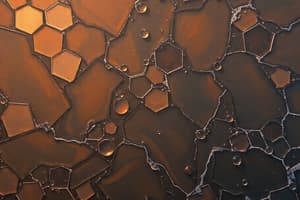Podcast
Questions and Answers
What is the wavelength range used in the assay principle of creatinine measurement?
What is the wavelength range used in the assay principle of creatinine measurement?
- 380-420 nm
- 620-650 nm
- 550-580 nm
- 480-520 nm (correct)
What is the temperature range for the assay conditions?
What is the temperature range for the assay conditions?
- 30-35°C
- 20-25°C (correct)
- 25-30°C
- 15-20°C
What is the purpose of reading the initial absorbance (A1) in the assay?
What is the purpose of reading the initial absorbance (A1) in the assay?
- To calculate the rate of reaction
- To measure the concentration of creatinine
- To set a baseline for the reaction (correct)
- To measure the concentration of protein
What is the normal range of creatinine levels in males?
What is the normal range of creatinine levels in males?
What can cause creatinine levels higher than normal levels?
What can cause creatinine levels higher than normal levels?
What is the minimum loss of renal function required to increase serum creatinine from 1.0 to 2.0 mg/dL?
What is the minimum loss of renal function required to increase serum creatinine from 1.0 to 2.0 mg/dL?
How do creatinine levels compare to blood urea nitrogen (BUN) levels in response to kidney problems?
How do creatinine levels compare to blood urea nitrogen (BUN) levels in response to kidney problems?
Why do creatinine concentrations tend to be higher in men than in women and children?
Why do creatinine concentrations tend to be higher in men than in women and children?
Study Notes
Creatine and Creatinine
- Creatine is synthesized in the liver, pancreas, and kidneys from the amino acids arginine, glycine, and methionine.
- Creatine is transported through the circulatory system to muscle where it is converted to phosphocreatine and acts as an energy reservoir.
- Creatinine is a waste product produced in muscles from the breakdown of creatine through hydrolysis.
Importance of Serum Creatinine Measurement
- Determining serum creatinine levels helps assess kidney function.
- Serum creatinine is a more specific and sensitive indicator of renal disease than Blood Urea Nitrogen (BUN).
Why Serum Creatinine is a Better Indicator than BUN
- Production of creatinine depends on an individual's muscle mass, which usually fluctuates very little with normal kidney function.
- As a result, the amount of creatinine in the blood remains relatively constant and normal.
- Creatinine is affected very little by liver function, making an elevated blood creatinine a more sensitive indication of impaired kidney function than BUN.
Disadvantages of Serum Creatinine
- Serum creatinine is very insensitive to even substantial declines in glomerular filtration rate.
- Glomerular filtration rate may be reduced by up to 50% before serum creatinine becomes elevated.
Sample Collection and Stability
- Serum or plasma samples are required for creatinine measurement.
- The only acceptable anticoagulants are heparin and EDTA.
- Creatinine in serum is stable for 24 hours at refrigerated temperatures (2 - 8°C) and several months when frozen (-20° C).
- Spot urine or 24-hour urine sample collection is needed for the measurement of urine creatinine.
Assay Principle and Procedure
- The Jaffé technique, described in 1886, is still the most widely used method for measuring creatinine in biological fluids.
- Creatinine in alkaline solution forms a yellow-red complex with alkaline picrate.
- The assay procedure involves mixing and reading absorbance at specific wavelengths and temperatures.
Normal Range and Variables
- Normal creatinine levels:
- Male: 0.6–1.4 mg/dl
- Female: 0.6–1.2 mg/dl
- Creatinine concentrations are slightly higher in men than in women and children due to muscle mass.
- Creatinine levels higher than normal may be due to prerenal causes (e.g., heart disease, dehydration), muscle disease (e.g., acromegaly), or renal causes (e.g., impaired kidney function).
Studying That Suits You
Use AI to generate personalized quizzes and flashcards to suit your learning preferences.
Related Documents
Description
This quiz covers the synthesis, transport, and function of creatine in the human body, specifically its role in muscle energy reservoirs. It also discusses the determination of serum creatinine, an important clinical test.




